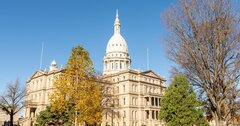

The 100th Michigan Legislature — which ran from 2019 to 2020 — approved the least amount of business subsidies since 2001, according to a scorecard compiled by the Mackinac Center. While lawmakers may be tempted to give state taxpayer dollars to some businesses in the name of creating jobs, the policy is ineffective, unfair to companies that don’t get the handouts, and expensive for taxpayers.
There was just one addition to the scorecard during the past two years, a 2019 law to let a particular company keep collecting subsidies on a factory it purchased from a firm that was already getting them. There were some new business subsidies authorized in the state budget, but they were not included in the scorecard, since they were a small part of much larger spending bills.
All told, the $151 million in new business subsidies authorized over the past two years is lower than the previous record low set by 2001-02 Legislature, $224 million. Both were much lower than the $1.8 billion authorized by the previous Legislature of 2018-19.
But these weren’t the only votes taken by legislators in the past two years to play favorites with some businesses, just the ones that authorized subsidies.
Lawmakers voted to give some developers transferrable tax credits worth 25% of the amount they spend rehabbing buildings, with all deals not to exceed $5 million per year. Developers can also cash out these credits by selling them to other firms that owe taxes. The sales are usually at a discount, meaning the buyer receives less than cost to the state treasury in foregone taxes. But since the seller does not get to collect other taxpayers’ money, the law authorizing the tax credits is not included in the scorecard, which only covers votes on bills that transfer cash.
Local governments can also select certain buildings to receive property tax exemptions for up to 10 years. This favoritism was authorized for a 10-year period in 2005 but was extended in 2008, and in 2020 the 100th Legislature extended it further to 2025. While it is generally unfair to allow some property owners to be exempt from property taxes but not others, tax exemptions do not transfer money from one taxpayer to another, so the vote on extending the provision to 2025 is not included in the scorecard.
The Legislature approved one other piece of tax favoritism in 2020 that would have made the scorecard. But the bill died when, after the session was over, the governor refused to sign it. This one would have cost taxpayers $5 million by allowing certain developers who had lost their eligibility to claim a subsidy do so anyway.
Also not gaining the governor’s approval were bills that exempted certain business equipment from sales taxes and personal property taxes. Some lawmakers were concerned that these represented more special privileges for select companies. But they’re not; the sales tax is only supposed to apply to final purchases, because levying it on business equipment leads to “tax pyramiding,” with each provider in the supply chain paying taxes on taxes. Also, in 2014 voters endorsed getting rid of this kind of personal property taxes.
The noteworthy aspect of this Legislature is not that it amended existing programs, but rather that legislators abstained from approving others. Some of them wanted to spend $300 million more on a program that expired in 2020, but the proposal did not get a vote in either chamber.
With this and sideways spending on existing programs, the 100th legislature showed the least enthusiasm for business subsidies of any in recent years.
Permission to reprint this blog post in whole or in part is hereby granted, provided that the author (or authors) and the Mackinac Center for Public Policy are properly cited.
Get insightful commentary and the most reliable research on Michigan issues sent straight to your inbox.

The Mackinac Center for Public Policy is a nonprofit research and educational institute that advances the principles of free markets and limited government. Through our research and education programs, we challenge government overreach and advocate for a free-market approach to public policy that frees people to realize their potential and dreams.
Please consider contributing to our work to advance a freer and more prosperous state.

Donate | About | Blog | Pressroom | Publications | Careers | Site Map | Email Signup | Contact